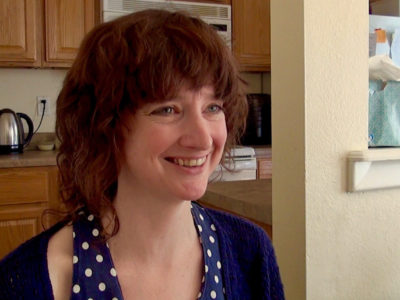Note from Shelley: In May 2013, Gary Taubes, author of Why We Get Fat, gave a lecture to a packed audience at the University of Colorado Medical School. To hear to entire presentation, listen here (90 minutes).
Taubes on Thermodynamics
In this video excerpt, Gary Taubes explains why he believes Calories In – Calories Out, and Energy Balance Equations are not enough to explain, or help, people with weight problems. And, given how he tells this story, you might call it, “What Gary Taubes wishes he had told Jillian Michaels on Larry King Live when she lectured him about thermodynamics.”
Taubes Q&A at University of Colorado Medical School
TRANSCRIPT OF “GARY TAUBES TALKS THERMODYNAMICS” FOLLOWS:
GARY TAUBES: Whenever anyone argues, like I do, that this energy balance, calories in, calories out thing is meaningless, like I do, we’re accused of not understanding the laws of thermodynamics. I was actually on the Larry King show when Good Calories, Bad Calories came out. And Jillian Michaels, a trainer from the Biggest Loser, came on from Los Angeles, and gave me a lecture on thermodynamics on national television. And after we went to a commercial break, I turned to Dr. Oz, who was sitting next to me, and said, I have a physics degree from Harvard. Jillian Michaels just lectured me on thermodynamics. You can watch this clip from TV. I’m literally speechless. It’s on Youtube.
We believe this stuff about calories because of the First Law of Thermodynamics, which is the law of energy conservation. Simply put, energy is not created or destroyed. The idea is that if the system gets more massive, it’s taking in more energy than it expends. The system gets less massive, it doesn’t matter what the system is. It’s got to take in less energy than it takes in. We can’t create energy from nowhere, we can’t make energy back. It can only change forms. It’s very simple.
It gets translated into this energy balance equation: Delta E – the change of energy in a system is equal to the energy that goes in, minus the energy goes out. Okay? And in terms of our obesity issue, Delta E becomes our fat stores or our energy stores. So change in fat mass = energy consumed minus energy expended. And what we do with this law is we say, Look. If E-in goes up, if I eat more, and E-out doesn’t change, because I don’t compensate by exercising more, Delta E becomes positive and I start storing energy. In other words, if E-In goes out, and If E-Out doesn’t change, Delta in becomes positive, Therefor, eating too much causes obesity.
And if E-Out goes down. If I become sedentary. If I have an accident and I break my leg and I don’t compensate by eating less, Delta-E becomes positive. I start storing energy, therefore sedentary behavior causes obesity. So it makes perfect sense. It’s completely logical. The problem is there’s no arrow of causality in this law. By that I mean, all the laws of thermodynamics say are if a system gets bigger, this is what happens, and if it gets less massive, this is what happens. But it says nothing about why the system gets more or less massive.
For instance, a star can get more massive, but we know that it’s not eating more.
So it’s an association. This is the way the universe works. It’s a law. It’s always true. But it tells us nothing about causality.
So one way to think about it, as a metaphor, is imagine that we’re walking by the hallway here, and we look in and we see this room is packed with energy. So you want to ask me, why is this room so crowded with energy, same way you want to know why this person’s fat tissue is so full of energy? Okay? So it’s an equivalent thing, and so you say to me, Gary, Why is that room so full of energy, and I say “Because more people entered than left.” It’s the equivalent of saying more energy came in than left, which is equivalent to saying that person got fat because they took in more energy than left. Have I told you anything you didn’t know? It’s obvious more people entered than left, because the room is crowded. That’s a given.
So you say, Gary, that’s a given. I want a real answer. Not this bogus more people entered than left thing.
So I say, Ah, okay. But . . . If more people enter than leave, it’s got to get more crowded, right? Which is equivalent to saying, if you eat more than you expend, you have to get fatter. I haven’t told you anything yet. Are you still satisfied with my answer? And I hope by this time, you’re ready to slap me.
So what could be an explanation? Why could this room be so full of energy? Maybe there’s a lecture going on. Maybe there’s a compelling speaker. Maybe there’s free drinks in here. Maybe you notice that Angeline Jolie and Brad Pitt have stumbled in and are sitting in the front row. Maybe the air conditioner worked in here but nowhere else in the building. It’s 95 degrees everywhere else but only 72 degrees in here. Maybe the fire alarms went off outside, and the sprinkler system went on, and this is the only room that wasn’t wet. Maybe there are large members of the University of Colorado football team standing at the door, throwing people in and not letting them leave. These are all explanations for why this room is full of energy in the form of people. They talk about the conditions inside the room, the speaker, the free drinks, Angelina and Brad. The temperature differential between inside and outside the room, right? The water outside from the sprinkler. Even the conditions at the boundary – the big football players throwing people in and not letting out. These are all meaningful explanations.
That more energy in the form of people coming in than left is meaningless. That’s a given. In fact it doesn’t even tell you if the room is too crowded. It only tells you that the room’s getting more crowded.
The point is, when you say that same thing about obesity, that if people got fatter, they took in more energy than they expended. That is a given. This is the single biggest mistake that was made in obesity research. It was always there. It was embraced in the 1950s and it became the conventional wisdom. Nobody questioned it. I didn’t question it. It seems obvious. The laws of thermodynamics say nothing about obesity. They’re completely irrelevant. They’re always true, Jillian! (LAUGHTER) But they say nothing about why we get fat.
And when I was lecturing at the recently to a group of cardiologists at the Mayo Clinic, I said, Why is it that from the moment you enter medical school to the moment you retire, the only condition that you will ever diagnose with a physics textbook is obesity. This is biology, folks. This is endocrinology. It’s physiology. Physics has nothing to do with it. The laws of thermodynamics are always true. The energy balance equation is irrelevant. If somebody’s getting fatter, I guarantee that they’re expending less energy than they’re taking in. As long as they’re getting heavier. And if they’re getting leaner, they’re expending more energy than they’re taking in. Given. Let’s never discuss it again. And if you say it to your patients, you’re telling them nothing. You’re telling them that the lecture hall was crowded because more people entered than left.






3 comments for “Gary Taubes Explains Thermodynamics . . . to Jillian Michaels . . .”